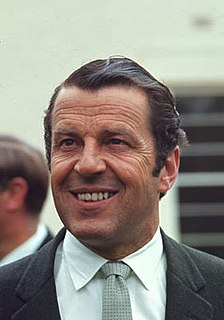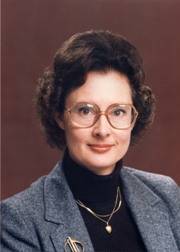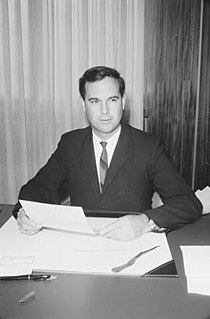
The Australian Democrats is a centrist political party in Australia. Founded in 1977 from a merger of the Australia Party and the New Liberal Movement, both of which were descended from Liberal Party dissenting splinter groups, it was Australia's largest minor party from its formation in 1977 through to 2004 and frequently held the balance of power in the Senate during that time.
The Australia Party was a minor political party established initially in 1966 as the Liberal Reform Group. As the Australia Party, it became influential, particularly in the landmark 1972 federal election when its preferences assisted the Australian Labor Party to victory—ending 23 years of Liberal/Country Coalition government.
Liberalism in Australia dates back to the earliest Australian pioneers and has maintained a strong foothold to this day. Liberalism in the country is primarily represented by the centre-right Liberal Party. The Liberal Party is a fusion of liberal and conservative forces and are affiliated with the conservative centre-right International Democrat Union. Philosophical liberals are often called a "small-l liberal" to distinguish them from conservative members of the Liberal Party.

Donald Leslie Chipp, AO was an Australian politician who was the inaugural leader of the Australian Democrats, leading the party from 1977 to 1986. He began his career as a member of the Liberal Party, winning election to the House of Representatives in 1960 and serving as a government minister for a cumulative total of six years. Chipp left the Liberals in 1977 and was soon persuaded to lead a new party, the Democrats who, he famously proclaimed in 1980, would "keep the bastards honest". He was elected to the Senate on 10 December 1977 and led the party at four federal elections. From 1983 it held the sole balance of power in the Senate.

Janine Winton Haines, AM was an Australian politician who was a Senator for South Australia from 1977 to 1978 and again from 1981 to 1990. She represented the Australian Democrats, and served as the party's leader from 1986 to 1990, becoming the first female federal parliamentary leader of an Australian political party. She was pivotal in "shaping the Australian Democrats into a powerful political entity that held the balance of power in the Senate".

Raymond Steele Hall is a former Australian politician who served as the 36th Premier of South Australia from 1968 to 1970. He also served in the federal Parliament as a senator for South Australia from 1974 to 1977 and federal member for the Division of Boothby from 1981 to 1996.
Robin Rhodes Millhouse, QC was, at various times, the 39th Attorney-General of South Australia, the first Australian Democrats parliamentarian, and the Chief Justice of both Kiribati and Nauru and a judge of the High Court of Tuvalu.

The Liberal Movement (LM) was a South Australian political party which existed from 1973 to 1976, and was a forerunner to the Australian Democrats.
David Bernard Vigor was a member of the Australian Senate, representing the Australian Democrats and the Unite Australia Party.
Martin Bruce Cameron is an Australian politician. He was a Liberal Party of Australia member of the Australian Senate from May to October 1969. He was later a member of the South Australian Legislative Council from 1971 to 1990, sitting as a Liberal except during 1973–76, when he represented the splinter Liberal Movement.

State elections were held in South Australia on 17 September 1977. All 47 seats in the South Australian House of Assembly were up for election. The incumbent Australian Labor Party led by Premier of South Australia Don Dunstan won a fourth term in government, defeating the Liberal Party of Australia led by Leader of the Opposition David Tonkin.

State elections were held in South Australia on 12 July 1975. All 47 seats in the South Australian House of Assembly were up for election. The incumbent Australian Labor Party led by Premier of South Australia Don Dunstan won a third term in government, defeating the Liberal Party of Australia led by Leader of the Opposition Bruce Eastick.

The 1977 Australian federal election was held in Australia on 10 December 1977. All 124 seats in the House of Representatives and 34 of the 64 seats in the Senate were up for election.
This is a list of members of the South Australian House of Assembly from 1975 to 1977, as elected at the 1975 state election:
Heather Joyce Southcott, AM was an Australian politician, representing the South Australian House of Assembly seat of Mitcham for the Australian Democrats. She was the first woman to lead a parliamentary political party in Australia.
John Gordon "Jack" Evans was an Australian businessman and politician who served as an Australian Democrats senator for Western Australia from 1983 to June 1985.
This article provides information on candidates who stood for the 1977 Australian federal election. The election was held on 10 December 1977.
This is a list of members of the Australian Capital Territory Legislative Assembly from 1975 to 1979. This was the first time this body sat; it was not self-governing at this time.

The Liberal Party of Australia , commonly known as the South Australian Liberals, is the South Australian Division of the Liberal Party of Australia. It was formed as the Liberal and Country League (LCL) in 1932 and became the South Australian Division of the Liberal Party when the Liberal Party was formed in 1945. It retained its Liberal and Country League name before changing to its current name in 1974. It is one of two major parties in the bicameral Parliament of South Australia, the other being the Australian Labor Party. The party has been led by Leader of the Opposition David Speirs since the 2022 state election after a one-term government.
The 23 objectives of the Australian Democrats were balloted by the membership in 1997, and represent an attempt through participative democracy to codify the overall policy aims and objectives of the Australian Democrats.







